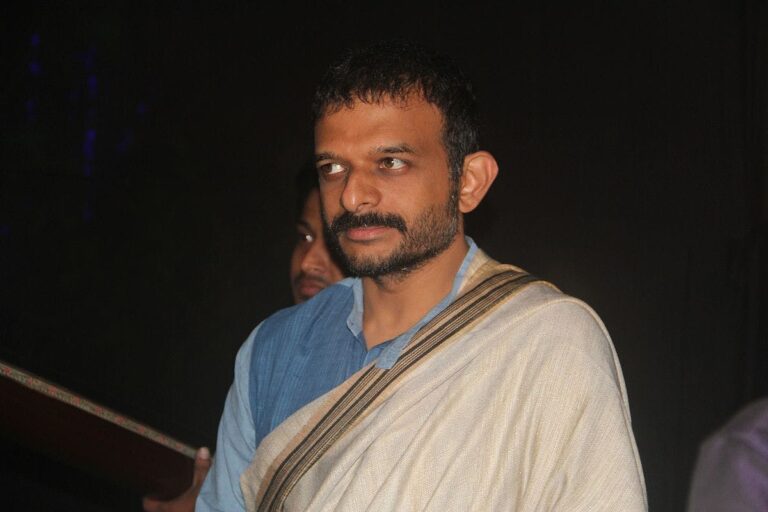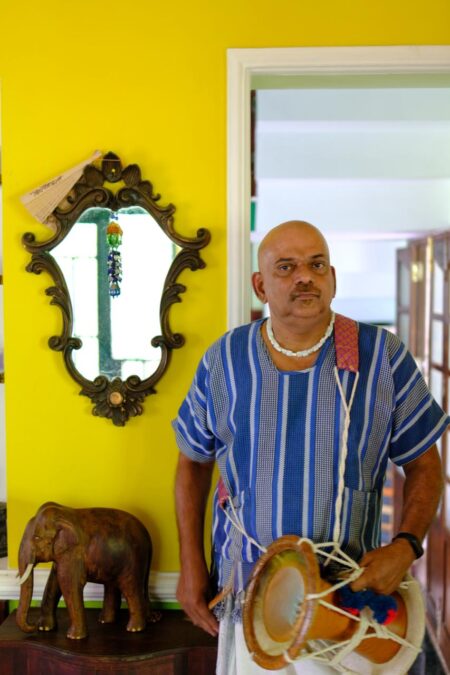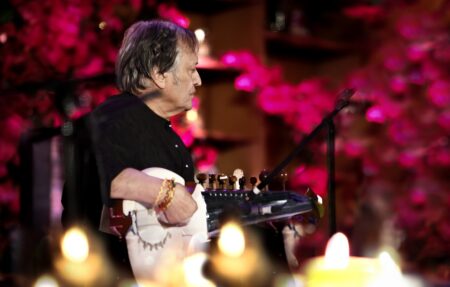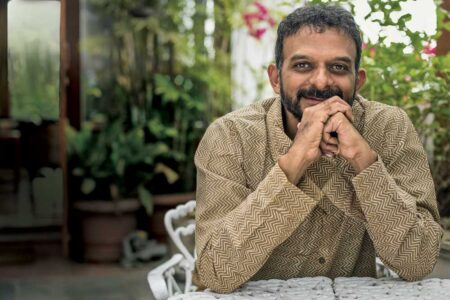Musician, writer, activist and cultural historian, Thodur Madabusi Krishna (TM Krishna) wears many hats. One of the most important presences in the Indian intellectual sphere, the Karnatic vocalist speaks on the role of art and artists in nation-building and more.The spirit of the ‘left’ is necessary for any country that wants to nurture a caring society, he tells India Art Review’s Founder and Editor, KTP Radhika.
Amusician as an activist is a rarity in India, unlike in the west or other geographies (from Dylan to Marley to Seeger to even an Eminem or David Rovics). Plus, you represent a very conservative branch of Indian music: Karnatic. So, what prompted you to start ‘talking’ while ‘singing’?
TM Krishna: Suppose we inverse the question. Why do musicians who belong to and practise music with cultural privilege almost never speak? The answer will give us insight into the nature of the art that is practised and patronised by this section of society. My speaking and writing come from a continued realisation of this rather insular, unquestioning and mindless nature of the art we inhabit. In fact, this goes against the grain of art itself. But since we have manicured ‘our art’ in such a manner that it has become an act of repetitive, habitual pleasure and plays the role of re-establishing our own self-proclaimed cultural/spiritual superiority, we are insensitive to the larger world. I refuse to remain in this ugly bubble. This does not mean I have found all the answers, actually, I am only looking for questions!
Should art be socially committed? Or is it the artist that should be and art can be free or such commitments
Art by its very nature is a social being. Each art form, its location, interpretation and limitations are framed in its social cradle. Whether or not an artist believes it, he/she is being social and political by practising the art. What I am calling for is an awareness of this constant. When I sing a Tyagarja kirtana in a sabha in Mylapore, it is a political and social act. I am actively participating in all that it represents and is conveying to those inside the auditorium and to the people who live beyond the compound wall. This consciousness will itself change the nature of the artist.
Critics say you’re patronising subaltern art forms. We understand you’re aware of your privileges, and the conflicts. How do you address these concerns?
The word patronising is itself deeply patronising! I will not use this word. I am trying to learn about the varied cultures that inhabit our land. Through this engagement, I have come to strongly believe that all seen/unseen and spoken/unspoken socio-cultural barriers that we have constructed need to be demolished. Having said this, I am acutely aware of the fact that my caste, gender and cultural privileges give me the audacity to say all this without fear. And this confidence has very little to do with my true intellectual abilities. Being conscious of this inherent ‘arrogance’ and yes, that is the word I will use, is very important.
This means that at no point can my music, words or activism muffle the voices of those on the margins. Therefore I have to learn when to speak, when to keep quiet and only listen. I will be the first to accept that I have made mistakes and that comes from the blindness that social privilege causes. But I have learnt and I am still learning. But I do feel very strongly that the transformation of the privileged is necessary and hence we have to engage and struggle with these complexities. I want to clearly qualify the word privilege, I am speaking of socio-cultural privilege. That privilege that a so-called upper-caste has and feels even if he is poor.
It is said that Karnatic Music by default has a conservative infrastructure and trying to change it is like changing the music form itself. Do you agree? If not, what are you actually trying to achieve through your “radical” ways?
This entirely depends on how you define Karnatik music. Karnatik music to me is the product of three elements — Raga, Tala/Laya and Text. Every aspect of its interior aesthetic is a result of an interaction between these three aspects. Everything else is external to this. If we look at the art form in this manner, we will realise change is possible. If we believe the music is the scaffolding that is tied together in caste, gender and religion-related discriminatory practices, then the music remains static. It is up to each musician to decide whether they want to break free and realise the music.
You’re known for your intellectual associations with left ideologies. A lot of youngsters today, including those who appreciate your works, are unaware of the Left parties or ideologies. What do you want to tell them about the importance of being on the left spectrum of ideologies?
The moment we use the word ‘left’, most people think of Stalin, Mao, and every other communist dictator. I am certain that many who write on social media platforms about the left, socialism and communism have not read any book, let alone Karl Marx. I will be categorical when I say that every communist dictatorship was philosophically anti-left and against the very core of humanity. I cannot provide a crash course on what it means to incorporate within ourselves ideas from the left, but the core of its philosophy lies in shifting the basis of reflection from the ‘self’ to the community.
This shift is especially important to those who have social, political, cultural or economic capital. Beneath this intent is a very important prerequisite, that thoughts and action must come from rational thinking and critical questioning. This becomes very important because societies’ powerful hold on to their position using irrational even mystical storylines. The essence of communism is challenging power and production. And production on the larger canvas refers to the idea of value creation and hence encompasses every type of human activity and the disparities that plague them.
The ‘left’ (with all its shades) in India is a good example of its philosophical, political and social role in a democratic society. Like with every ideology, not all communist governments (in India) have been great, but that cannot erase the contribution of the ‘left’ in empowering so many on the margins. It is about everyone speaking on an equal footing, which is why protest is such a powerful ‘left’ tool. It allows the powerless to come together and collectively raise their voice on the street.
I often feel that many middle-class and/or so-called upper-castes citizens oppose the left because it disturbs their status quo. It may change their cultural habitat and god forbid give the marginalised the strength to challenge them. Whether or not a communist party wins an election, the spirit of the ‘left’ is necessary for any country that wants to nurture a caring society.
You’re trolled and abused online. What keeps you motivated and spirited, other than music?
Trolling and abuse don’t bother me. Such comments are reflective of the people who write those words. To remain motivated I just need to listen to some magical music and from that clarity emerges.
You keep commenting on political issues. There are two views about the political trajectory of today’s India. One is that the country is slipping into a majoritarian managed democracy; the other is that secular liberalism has historically prevented India’s rise and now is the time to right the wrongs of the past. How do you look at these arguments?
Let us tackle the ‘other’ view first. There is absolutely no logic in the argument that being secular and liberal held this country back. I presume that these people are not speaking about economic policy because that changed in the early 1990s and has remained more or less the same irrespective of who came to power. So what they are complaining about is that fact that parochial, narrow Hindu majoritarian ideas were held at bay by secular liberalism. I am more than happy that this was the case.
The BJP government and their tentacled outfits are going out of their way to describe the past 70 years of our existence as a complete failure. Simply put, this is utter rubbish, but it is a religiously polarising narrative. By convincing a large section of Hindus that they are under attack from Muslims and anyone who speaks of secularism, the BJP and the RSS have created a false fear and are now regularly tapping into it for their continued survival. They have coloured anyone who is critical of them as anti-Hindu. None of this has any basis in reality and truth. Independent India has definitely had a chequered, complex past. But a holistic, composite view of this past is the liberal view. This is what the present establishment is making sure you do not get. Today, India is at the precipice and this one is scary because the veil of democracy hides from our eyes the deep fall that is right ahead.
Your book ‘Sebastian and Sons: A Brief History of Mridangam Makers’ describes the power relations between Mridangam players and makers. It came out when we are actively discussing majoritarian democracy, caste discriminations, power relations and gender equations including the Metoo movement. Did you plan on the timing of the book?
The timing of the book was accidental. I had worked on the book for around four years. It so happened that it came out when such discussions were active. I do hope the book contributed to a more robust and reflective continuation of such dialogues.
Interview done for Number13.in




